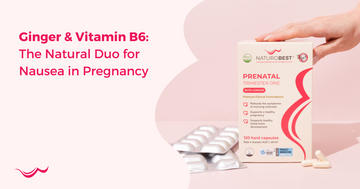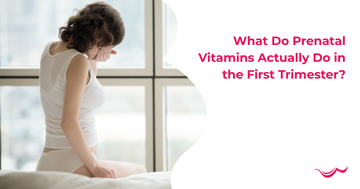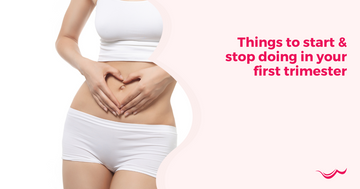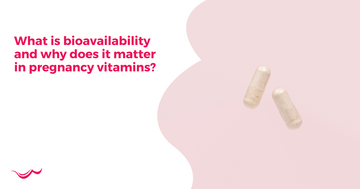
It is important to test your vitamin D levels during preconception before trying to conceive, so that you can prepare for a healthy pregnancy. Read on to learn more about why vitamin D is important during pregnancy.
Key Takeaways:
- Vitamin D supplementation is important for a healthy pregnancy.
- Vitamin D status can be impacted by intake and sun exposure.
- Vitamin D deficiency during pregnancy can increase the risk of poor outcomes such as low birth weight and gestational diabetes.
- The body produces most of your vitamin D, but diet and vitamin D supplements are beneficial to support vitamin D status.
Vitamin D and Pregnancy
Regardless of your vitamin D status, you should ideally be taking a preconception multivitamin for a minimum of 3-4 months before trying to conceive. Detecting vitamin D deficiency early in the process gives you the opportunity to address the deficiency, so that you can reduce the risk of poor pregnancy outcomes associated with vitamin D deficiency.
Vitamin D is an important nutrient needed for the baby’s bone development and cell growth. It is important for healthy placental function and immune function to reduce the risk of infection and inflammation. Vitamin D also plays a role in calcium absorption from the digestive tract.
Good vitamin D levels are also protective against miscarriage and promote healthy brain and nervous system development of the foetus, so ensuring your levels are adequate before trying for a baby and especially in the first trimester is important.
Vitamin D Status in Pregnancy
Contributing factors to vitamin D deficiency in pregnancy may relate to low sun exposure, clothing coverage, not taking a prenatal vitamin and the climate you live in. Vitamin D status in pregnancy can be influenced by many factors such as skin pigmentation (darker skin needing more sunlight), use of sunscreen and where you live/seasonal variations.
Many women wonder when to start taking prenatal vitamins. It is recommended to take a preconception multivitamin that contains vitamin D for 3-4 months before trying to conceive and then move on to a prenatal vitamin that contains vitamin D as soon as you find out you are pregnant and continue taking it throughout your whole pregnancy.
The recommended daily intake (RDI) for vitamin D3 in pregnancy is 200IU, so your prenatal multivitamin should contain at least 200IU.
Some women ask if you can take 1000IU of vitamin D during pregnancy. Studies have shown that vitamin D supplementation with up to 2000IU per day is effective in achieving vitamin D levels in pregnant women. If a vitamin D deficiency has been detected on a blood test, you may need to have a higher dosage, but this is worth discussion with your trusted health professional first.
Low Vitamin D in Pregnancy
Many women find their vitamin D is low in pregnancy. Around 50-94% of high-risk pregnant women (veiled, dark skinned or obese) were reported to be vitamin D deficient in Australia and New Zealand. It was even shown that around 25-55% of lower-risk pregnant women were vitamin D deficient as well.
There is a link between vitamin D deficiency during pregnancy and poorer outcomes for both mother and baby, including gestational diabetes, pre-eclampsia, preterm labour, low birth weight and C-section delivery.
If you are vitamin D deficient, you may be wondering if you can take extra vitamin D while pregnant. This depends on how deficient you are and how much vitamin D is in your current prenatal multivitamin, as a high dose could be unnecessary. Your health professional can give you more advice on whether you will need to take extra vitamin D.
What Are the Best Sources of Vitamin D During Pregnancy?
The main source of vitamin D is from the body’s production of vitamin D in the skin after exposure to sunlight. Sun avoidance can increase the risk of vitamin D deficiency; however, we also know that excessive sun exposure is a risk factor for skin cancer, therefore safe sun exposure is key.
People with pale skin will need less sun exposure compared to darker skin tones. The time of day also impacts how long you should stay in the sun.
Typically, around 10-30 minutes of safe sun exposure per day is adequate for vitamin D production, but try to make this at the morning or afternoon; away from the highest UV times of the day.
It is important to have regular skin checks, avoid sunburn, wear sunscreen and sun protective clothing to avoid excessive sun exposure. Not everyone will have the same exposure to sunshine as different areas will have different amounts of UV light. Different cultures and dress codes may also impact sunlight exposure.
A smaller amount of vitamin D comes from dietary sources and supplement intake. Many factors that contribute to vitamin D status cannot be changed, therefore it is important to eat foods that contain vitamin D and take a prenatal vitamin that contains vitamin D to reduce the risk of deficiency.
The main food sources of vitamin D include:
- Fish and seafood
- Eggs
- Butter
- Milk and dairy
Vegetarians and vegans do not consume these foods that are the main sources of vitamin D, therefore they are at a higher risk of deficiency. Around 10% of vitamin D is from diet, so supplementation through prenatal vitamins is a helpful way of boosting your vitamin D intake.
- Our Preconception Multi for Women contains 1000IU vitamin D3 per dose to help boost your vitamin D levels to help prepare your body for pregnancy.
- Our Prenatal Trimester One with Ginger contains 500IU to support a healthy pregnancy and foetal development.
- Our Prenatal Trimester 2 & 3 Plus Breastfeeding contains 1000IU to support maternal health and foetal development in the last half of pregnancy.
Unlike many prenatal supplements that use vitamin D derived from sheep’s wool, NaturoBest uses VegaDelight®, a vegan, plant-based vitamin D sourced from lichen.
Choosing a high-quality prenatal supplement with the right amount of vitamin D helps support your health and your baby’s development throughout every stage of pregnancy.




